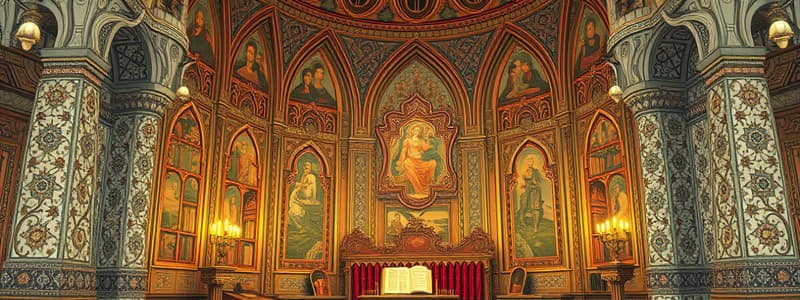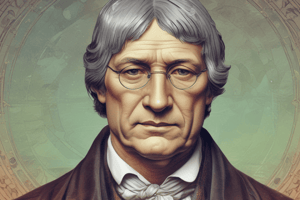Podcast
Questions and Answers
What characterizes the inherent principle of the Oriental World in Hegel’s philosophy?
What characterizes the inherent principle of the Oriental World in Hegel’s philosophy?
- Substantial Morality (correct)
- Empirical Science
- Abstract Political Theory
- Individualism and Personal Freedom
How does Hegel describe the relationship between morality and law in the Oriental World?
How does Hegel describe the relationship between morality and law in the Oriental World?
- Morality is independent of law and is based on subjective choice.
- Laws are formed purely from subjective moral beliefs.
- Morality is enforced by individual conscience and freedom.
- Law serves to govern the subjective will through external morality. (correct)
What aspect of consciousness does Hegel suggest is necessary for the formation of abstract distinctions?
What aspect of consciousness does Hegel suggest is necessary for the formation of abstract distinctions?
- Political Power
- Historical Narrative
- Aesthetic Reflection
- Language and Expression (correct)
What does Hegel imply about the state of individuals in the Oriental World regarding moral law?
What does Hegel imply about the state of individuals in the Oriental World regarding moral law?
In Hegel’s analysis, what is the primary function of government in the Oriental context?
In Hegel’s analysis, what is the primary function of government in the Oriental context?
What role does Hegel attribute to subjective will in the context of Oriental morality?
What role does Hegel attribute to subjective will in the context of Oriental morality?
What is suggested about pre-political life in Hegel's philosophy of history?
What is suggested about pre-political life in Hegel's philosophy of history?
What does Hegel believe is not recognized in the moral principles of the Oriental World?
What does Hegel believe is not recognized in the moral principles of the Oriental World?
What is suggested about the relationship between law and moral sense in the current state of consciousness?
What is suggested about the relationship between law and moral sense in the current state of consciousness?
What does the term 'Theocracy' refer to in the context of the Constitution mentioned?
What does the term 'Theocracy' refer to in the context of the Constitution mentioned?
How is the law perceived in the context of moral responsibility according to the passage?
How is the law perceived in the context of moral responsibility according to the passage?
What characterizes the social structure of China as described in the passage?
What characterizes the social structure of China as described in the passage?
What does the passage suggest about the Unity of political organization in the Indian realm?
What does the passage suggest about the Unity of political organization in the Indian realm?
Who stands at the head of the Spiritual Empire of the Mongols?
Who stands at the head of the Spiritual Empire of the Mongols?
What happens to the sphere of subjectivity in the laws of governance as described in the passage?
What happens to the sphere of subjectivity in the laws of governance as described in the passage?
In what way does the text characterize the Indian realm compared to China?
In what way does the text characterize the Indian realm compared to China?
How is the concept of God viewed in the East according to the passage?
How is the concept of God viewed in the East according to the passage?
What is implied about the moral actions of individuals according to the passage?
What is implied about the moral actions of individuals according to the passage?
Flashcards are hidden until you start studying
Study Notes
Hegel’s Philosophy of History: The Oriental World
- The study of the Oriental World begins only from the emergence of structured States; earlier developments, like language and race formation, are pre-historical.
- History is characterized as prose, distinguishing it from myths and symbols that lack concrete factual basis.
- Consciousness of existence is linked with the ability to form abstract thoughts, which progresses alongside the capacity to express laws governing life.
- Historical understanding requires moving beyond mere subjective disposition or conscience; it is rooted in external laws shaping society.
- The Oriental World is defined by morality as a substantial principle, presenting the first instance of the subjugation of arbitrary will to moral laws.
- Laws in the Oriental World dictate moral distinctions, with the subjective will subjected to external authority rather than personal conviction.
- Justice in this context is enforced through external moral structures, governed by a form of compulsion, without recognition of internal moral sentiments.
- While the laws may embody ethical perfection, moral actions are legislated and performed externally, lacking an intrinsic motivation or internal sanction.
- The spiritual development of the individual is still closely tied to natural conditions, with Law and Moral Sense not yet differentiated.
- Religion and the State are unified under theocratic principles, where divine authority permeates secular governance.
- The Oriental conception of God remains undeveloped in comparison to later Western notions that aspire to higher spiritual consciousness.
- The law is perceived as an absolute external force rather than a reflection of individual will.
- The Asiatic World is divided into four historical regions:
- River-plains of the Yellow and Blue Streams (China and Mongols)
- Ganges and Indus valleys
- Oxus and Jaxartes, Persia, and Euphrates-Tigris valleys (Hither-Asia)
- Nile River Plain
- History in China and the Mongols begins under a theocratic despotism, characterized by a patriarchal structure.
- In China, the Monarch acts as both Chief and Patriarch, managing laws that merge civil and moral requirements; individual subjectivity is not fully developed.
- The Mongol spiritual sovereignty, led by the Lama, lacks a secular political structure, signifying differences in governance between the two cultures.
- The Indian realm displays a disrupted political unity compared to China, showcasing diverse civil structures.
Studying That Suits You
Use AI to generate personalized quizzes and flashcards to suit your learning preferences.




